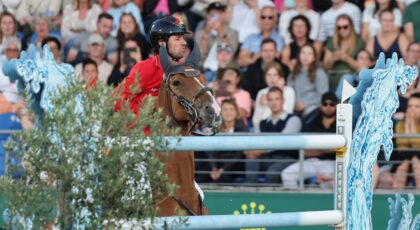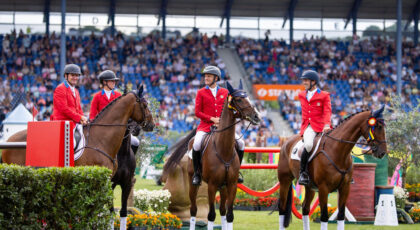It’s been nearly 25 years since I got my USEF judge’s license.
Yet, I can still easily remember the young girl I used to be, sitting ringside with a notebook and a pencil, “judging” classes for fun. When the jog was called, I nearly shook with anticipation, waiting to hear whether I had recorded the same results as the judge.
I’m still in touch with that part of me that always knew I wanted to be a judge. I never wanted to be a judge for the money (thank goodness, since the pay isn’t very good). I didn’t want to be a judge for the glory (sitting in that box all day through cold, rain, and the like didn’t seem glorious).
I wanted to be a judge because each class felt like a beautiful puzzle that was mine to solve. Even today, there’s nothing more satisfying to me than the satisfaction in scoring rounds and pinning a class the way I feel is right.
Over the years, I’ve judged all kinds of shows, from schooling shows to finals and in between. Here are some of the things I’ve learned along the way.
1. You better be organized
Most of judging is managing paperwork. I think only 25% of it is actually evaluating the riders and the horses. The rest is keeping a neat card (or often several cards at once), accurately writing down numbers, and doing the mental calculus to pin each class.
2. Watching horses all day is really tiring!
You wouldn’t believe how exhausting it is sitting in one place for hours on end watching round after round. You can’t let your mind wander or take a mental break. You can’t even leave the booth for lunch! I’m never more tired than I am after a long day judging.
3. Having a great memory is invaluable
The best judges can remember a round from 8:02 in the morning ten hours later like the horse had just walked out of the ring. They essentially have an instant replay at the ready in their head and use it to compare the first horse in the class to the last horse in the class, even if that class stretches all day long.
4. The judges are rooting for you!
I somehow used to think judges by nature were critical people who wanted to find fault in rounds. But it’s quite the opposite. Instead, we’re often good at seeing the positives in a flawed performance. All we want to do is see good rounds. If a rider is on fence 8 out of 9 and laying it down, I’m silently praying for them to nail jump 9.
5. Judging a bad class is much harder than judging a good class
Picking the best round among many excellent trips is a judge’s dream. What’s hard is sorting out rounds full of mistakes. I never feel good if I don’t at least have a clear winner, and sometimes there really isn’t a clear winner.
6.Somehow I still love it, even after all these years
The long days. The hard work. The pressure. The bad weather. The poor food. The travel. The hotel rooms. On its face judging doesn’t really have a lot to recommend it. But if you love it, you’ll still keep doing it. I know I will!
About the Author
Kim Ablon Whitney is a USEF ‘R’ judge in hunters, equitation, and jumpers. She is also a writer and has a new book series out for young readers, #BarnBFF.


 June 13, 2019
June 13, 2019 
























